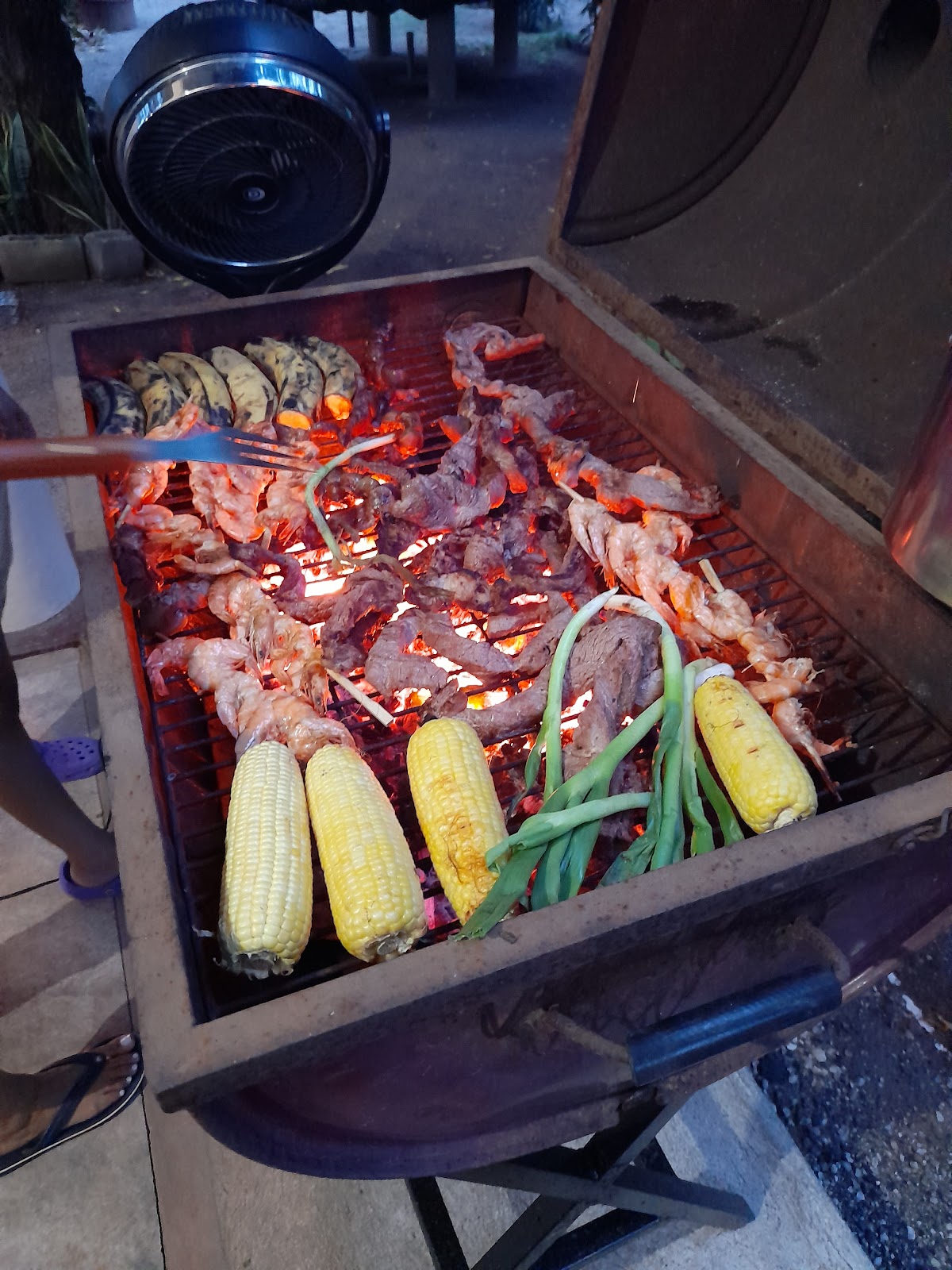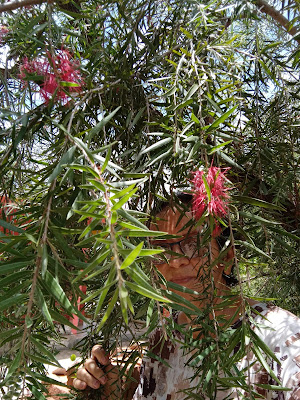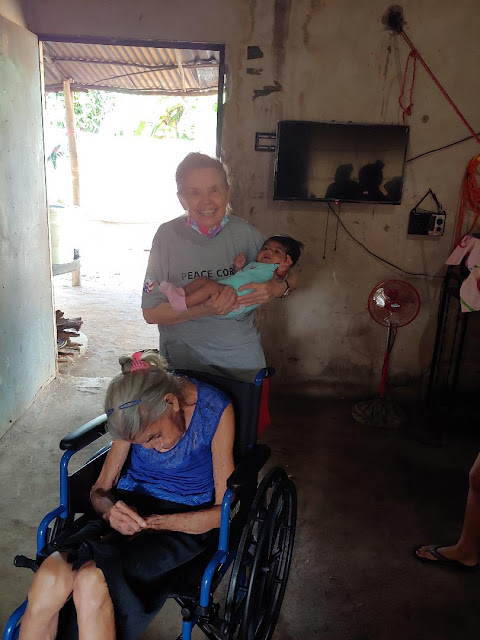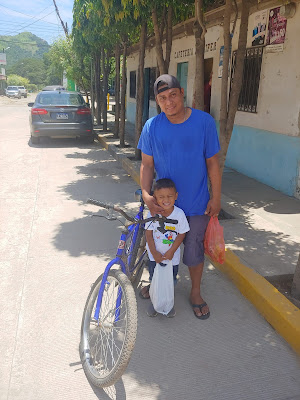As before, I tucked hundreds of US dollars of different denominations into a money belt to be worn around my waist under clothing and kept under my pillow at night.
However, my 2 failed efforts to depart on Spirit Airlines obliged
Art and his traveling companion to finally start out without me because of a
reservation at an Air B&B in the capital.
The airport I was planning to leave from was BWI, near
Baltimore, just north of my home in Washington, DC, and each time, I arrived
there early, at 4 pm for a 7:20 pm flight on Spirit Airlines. The first time
was on a Monday, July 18, when I had boarding passes already in hand at the gate when my luggage
was suddenly offloaded after a delay that meant I'd miss my connecting flight
to Honduras. Rescheduled now for 3 days later, I had to call my son, who had
dropped me off and was already headed back to his home in W. Va., asking him to
return to pick me up. Then on Thurs., July 21, I again waited at the airport
with a neighbor until being told only minutes before boarding that I needed to
submit health documents and a lengthy health questionnaire required of all American
travelers to Honduras and there wasn't enough time for that. My flight was
rescheduled once again for Sunday, although my traveling companions would no longer
be in San Pedro to meet me then.
Wash. Post, RIP,
Spirit — America’s most hated airline
So, I cancelled my reservation with
Spirit going into San Pedro Sula and still hope to recoup credit there (advice about doing that would be most welcome) and bought a new ticket on American Airlines.
One week after my original departure date, my American flight finally landed
at Palmerola, a brand new airport outside the capital of Tegucigalpa, formerly
part of the adjacent US army base there. This time, I was met by Gustavo
Escoto, a judge in Choluteca, a city in the south. Before moving on, we ventured
briefly into Tegucigalpa. At one point, in a series of parking lots under commercial
buildings, Gustavo and I became separated and I waited for over an hour for him
to return with the car, imagining that all sorts of terrible things had
happened to him. We had simply lost each other in that big underground labyrinth.
Here below is the interior of a church in Tegucigalpa and other city scenes. Many thanks to Art for these photos and to both him and Gustavo for most of the other photos appearing on this posting.
Below, I am seen handing over a cash donation in US dollars to Luis Knight of the Honduran Red Cross at its headquarters in the capital later that evening after my arrival.
Luis had been my colleague in La Esperanza, my second Peace Corps site. Luis then narrated a video of the donation handover, saying the money would be used for a project in La Esperanza, where he owns a home and travels on weekends to be with his family. I had worked with Luis for more than a year in La Esperanza in 2002-2003, after extending my Peace Corps term. He and I then video-chatted with his family there, as I didn't have time to make a trip over the mountains to actually visit them in person. (Hondurans have taken cyber communication far beyond my own feeble efforts.)
For 3 more hours late into the evening, Gustavo and I traveled along a sparsely trafficked
brand new highway, winding around lush green mountains, so different from the
dusty drab dry-season vistas seen during previous visits in Feb. and March.
We finally arrived at his palatial 2-story home on the outskirts of Choluteca, all
lit up, with its protective walls, razor wire, and electric fences, being first
greeted by the family dog, an adolescent female German Shepard named Puppe with unclipped ears and tail. In Honduras, dogs live outside all year round,
never coming inside the house. Their job is mainly to stand guard. Gustavo’s
family home, which he had designed and monitored during its building, is
filled with traditional furniture and many replicas of well-known paintings and statuary. In the center of the house is an outdoor atrium with
comfortable furniture and filled with plants.
The next morning, I reconnected with Gustavo's wife Nely and son, Oliver, now 4 years old, and their live-in servant, Marta, age 25, who had been there when I’d visited 2 ½ years before. Gustavo is a judge in the Choluteca court and his wife works full-time at a bank, including on Saturday mornings. Son Oliver, whose name is even more uncommon in Honduras than in the US, is named for Oliver Cromwell. His parents plan to enroll him in a bilingual school. I brought Oliver some picture books and toy cars, though he hardly needed any more.
By daylight, the many charms of the house were on full view. The 4-year-old son and dog looked out at passing vehicles and pedestrians on the road beyond.
Above, the son plays with a ball. Windows look out on the interior atrium, also appearing below.
Here I point out a Renoir
replica. Gustavo has collected
these art works from his travels all over
the world.
Above is a Van Gogh replica.
Above the dining room china cabinet is a Dominican-Haitian original.
And here is some classical statuary.
From the start, I observed the same rules here as when I was a Peace Corps volunteer: never put toilet paper in the toilet, never drink tap water, and never eat raw vegetables, however tempting.
Marta, the maid, the youngest of 9 children, grew up in El Triunfo, my first Peace Corps site, where her widowed mother still lives. She has Sundays off and takes a bus to visit her mother one Sunday a month. Marta lives in a small separate cottage behind the main house. Since she was said to be religious, I’d brought her a religious-themed calendar, rosaries, and other devotional items.
Sometimes while the parents were at work, Marta would ask me to watch Oliver while she went up to the 2nd floor to do cleanup and make the bed in the parental suite. Oliver, a very active, inquisitive, and imaginative child entertained me by demonstrating the special quirks of his many toys and by building very tall Lego towers. He often tried to trick me about what his toys could do and I pretended to be tricked, then to be amazed at the outcome.
I was assigned the same room as before, a very large first-floor bedroom with private bath, a TV set. and its own remote-control A/C unit. The bathroom shower and faucets have no hot water, just water at room temperature, all that is needed in that year-round hot climate.
I washed my clothes out at the pila, but found that some strange holes had appeared in my irreplaceable Peace Corps t-shirt.
Nely, Gustavo's wife, stands behind their live-in maid, Marta.
While the parents were away at work, I tuned into local TV programs, where fast-food ads often appeared in the background or at the bottom of the screen during news broadcasts. The country’s economic growth was reported to have stalled. I learned that the euro had fallen almost to a par with the dollar. Ex-President Porfirio Lobo came on-screen thanking the US government for trying to help find the murderers of his son, an American citizen, shot and killed along with 3 others by MS-13 suspects while exiting a Teguc nightclub. Gustavo opined that the new president Xiomara, whose inauguration Kamala Harris had attended earlier in the year, has less control of the gangs than did disgraced former president Juan Orlando Hernández, now in US custody on drug charges, whose brother is already serving time in the US.
When leaving the house, facemasks were required at all times,
even when entering restaurants, though not while actually eating, of course. I
noticed the young son was not belted in on short drives. When I questioned
this, I was told that on longer drives, he uses a seatbelt with a special car seat.
One evening, I went out with Gustavo to pick up a prescription. The pharmacy
and its adjacent stores were all lit up, powered by a generator, but nearby
court offices and other buildings were all plunged into pitch darkness.
I finally caught up with Art in El Triunfo, my first Peace Corps
site, at the local health center, after first making a modest donation in Honduran currency to a
woman living across the road. She had lost her daughter to spina bifida back when
I’d lived there in 2000-2002. At that time, I’d helped the daughter obtain a
wheelchair and water mattress, but she still developed a pressure sore that led
to her death. Both spina bifida and cleft palate/harelip have become less
common now that pregnant Honduran women are being given folic acid by local
health centers, since the corn tortillas that are a dietary staple don’t
contain folic acid, mostly found in wheat flour and some other grains. The sign says "Welcome, Barbara".
Everyone at the Triunfo health center greeted me effusively with hugs. I left some Rx meds there, along with toys, sterile bandages, and extra clothing for child and adult patients.
Here above is Doctora Jeanette at the health center with a patient before her recent retirement. Below, she stands in the town square.
Then Art and I went with Dra. Jeanette, now retired, to take the wheelchair I'd brought to a lady who had suffered a stroke. The woman lives with her extended family in a tiny house (2 rooms), but now will be able to go outside and travel around town. I've already heard from Jeanette that the family has been taking her out and about.
I also distributed some clothes, toys, medications, and other items
from a suitcase that had been checked with the airline and gave the suitcase itself to
musician and welder Pedro Joaquín, who, along with his boys, entertained us with music and song.
I well remember when his twin daughters, now college age, were born. I
had given his wife calcium tablets from my own Peace Corps medical kit as she was then
nursing a baby on each breast. Now the girls, looking tall and heathy, attend classes in Choluteca, traveling there by bus.
The family had just moved to a vacant lot near the former family home and were in the process of constructing a new 2-story residence with their own labor. Pedro Joaquín said they had completely abandoned the old house; just walked away. This new one will have a flush toilet rather than the outdoor latrine at the old house. But the new house was still a work-in-progress. I sat with the family on the stairs of their brand new 2-story home.
Pedro J. is also a musician who, with his sons, plays at gigs in town and surrounding communities.
One son, above, plays drums. Another below plays sax.
Art and his traveling companion helped me track down Nerys now, as she was not at home. We found her attending a day-long evangelical meeting with her youngest child.
After making other rounds in town, we returned to Choluteca, where I had invited everyone out to dinner at a restaurant. We were only allowed to remove our masks while actually eating. Masking requirements are very strict in Honduras.
Art and his companion needed to return to San Pedo Sula, but I stayed on, twice visiting Reina, formerly of El Triunfo, who now lives in Choluteca after undergoing a stroke. At one of my visits, her 5-year-old granddaughter was there and I gave her some books, and also gave Reina some Honduran cash. The little girl was born in California, which may prove advantageous later in life. I was never able to see her mother, Solei, one of the secret twins depicted in my book Triumph & Hope.
Finally, I visited the Castro family who sell fried chicken, other foods, and also bottled water every day of the year, even on Christmas, at their market stall.
Photos were also taken at the Castros' home in Choluteca, but I only received them much later by way of their sister, Lesly, now living in NH with her former Peace Corps volunteer husband, Sam, and their 2 daughters. Lesly, a doctor with whom I'd worked at the Triunfo health center when I was a Peace Corps volunteer, now works in the US as a nurse practitioner, speaking Spanish with Spanish-speaking patients. She visited her family in Honduras last December with her younger daughter. I always stayed with her very hospitable family during my post-Peace Corps humanitarian visits, often sharing a bed, until Gustavo built his house and invited me there.



























































No comments:
Post a Comment